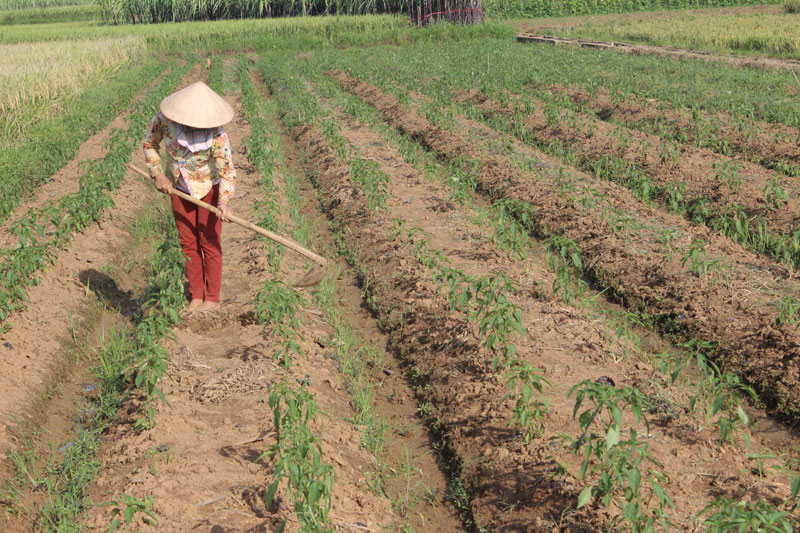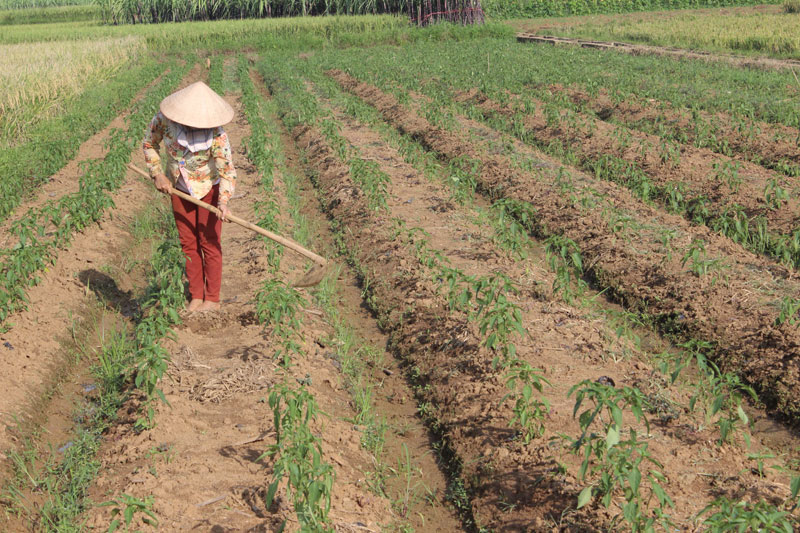
(HBO) – After 10 years of implementing the 10th Party Central Committee’s Resolution No. 26 NQ/TW on agriculture, farmers and rural development, the Party Committee, People’s Committee, divisions, sectors and organizations of Lac Son district has recorded progress in all aspects, while living conditions of local people have been improved significantly.

Photo: Chili cultivation model for export in Coi hamlet, Vu
Lam commune
Vu Lam commune began witnessing
strong transformation in 2011 when it was selected to carry out the new-rural
style area building programme. The district organised communication campaigns
to disseminate information about the resolution among public employees, party
members and residents. The outcomes of the activity was seen in shifting crops
for higher commercial value, with pioneering party members taking part in crop
rotation for annual revenue of over 100 million VND. In 2011 – 2015, Vu Lam
allocated nearly 67 billion VND for new-style rural development. Per capita
income of local people now stands at 30 million VND, and the rate of poor
household reduced to 4.8 percent.
Since the resolution was
brought into life, the spiritual and material lives of local resident in Lac
Son have seen changes. The Lac Son People’s Committee has issued policies to encourage
production. The district has paid due attention to hunger elimination, poverty
reduction, environmental sanitation and clean water, while poor people have
been assisted to get access to capital sources to expand production and build
houses. To date, more than 90 percent of rural residents have been enabled to
get access to clean water and 70 percent of households have owned husbandry
farms meeting hygiene standards. Per capita income in Lac Son now stands at 26
million VND and the rate of poor households is at over 30 percent. Local people
also have better access to healthcare services, including preventive health care
and vaccination. About 92 percent of residents have joined health insurance. Emulation
campaigns on building a civilized life in residential areas and sport-culture
drives have attracted large numbers of local people.
Concerning the new-style
rural area building programme, local farmers can directly make their
recommendations, join discussions to select prioritized tasks, and inspect the
progress of the work. By the end of 2016, five communes in Lac Son had met
new-style rural area standards. The district is working to have two more
communes fulfilling the standards this year.
According to data from the Hoa Binh Provincial Party Committee, the industrial production index for the first six months of 2025 is estimated to have increased by 20% compared to the same period last year. This marks the highest year-on-year growth rate for this period since 2020.
In the first six months of 2025, Hoa Binh province’s export turnover was estimated at 1.145 billion USD, marking an 18.11% increase compared to the same period in 2024. Import turnover was estimated at $ 804 million, a 17.15% increase, which helped the province maintain a positive trade balance.
The lives of the ethnic minority farmers in Tan Lac district have gradually improved thanks to the new directions in agricultural production. This is a testament to the collective strength fostered through the professional associations and groups implemented by various levels of the district’s Farmers’ Union.
With the motto the "product quality comes first,” after nearly one year of establishment and operation, Muong village’s Clean Food Agricultural and Commercial Cooperative, located in Cau Hamlet, Hung Son Commune (Kim Boi district), has launched reputable, high-quality agricultural products to the market that are well-received by consumers. The products such as Muong village’s pork sausage, salt-cured chicken, and salt-cured pork hocks have gradually carved out a place in the market and they are on the path to obtaining the OCOP certification.
In the past, the phrase "bumper harvest, rock-bottom prices" was a familiar refrain for Vietnamese farmers engaged in fragmented, small-scale agriculture. But today, a new spirit is emerging across rural areas of Hoa Binh province - one of collaboration, organisation, and collective economic models that provide a stable foundation for production.
Maintaining growing area codes and packing facility codes in accordance with regulations is a mandatory requirement for agricultural products to be eligible for export. Recently, the Department of Agriculture and Environment of Hoa Binh province has intensified technical supervision of designated farming areas and packing facilities to safeguard the "green passport" that enables its products to access international markets.



